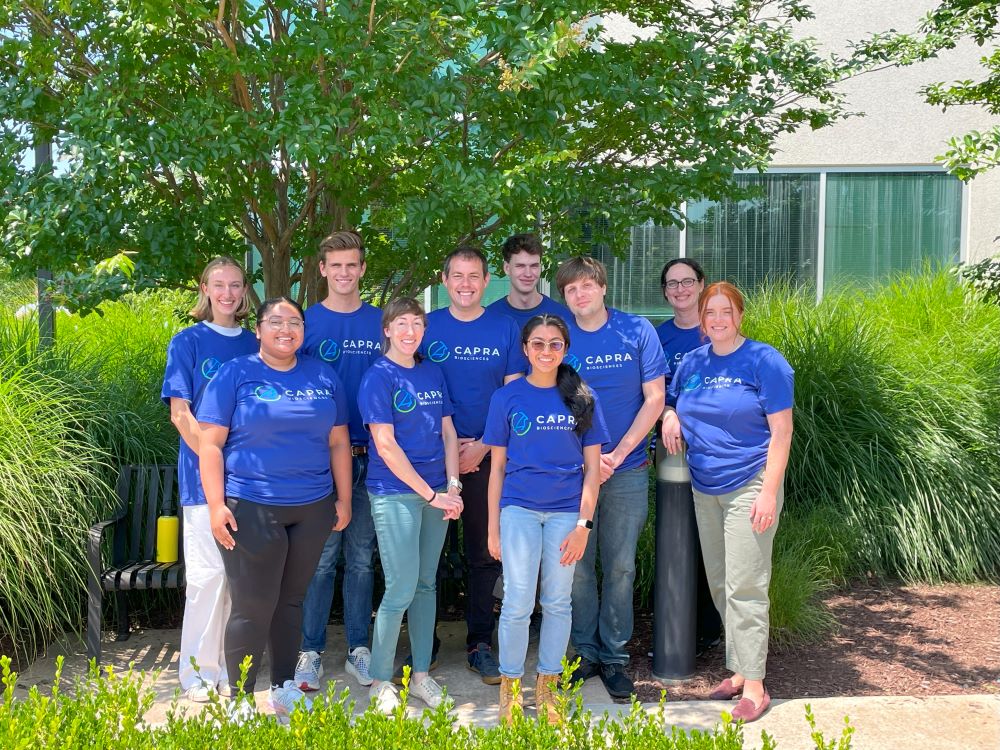After beginning life in the postdoc world, Manassas, Virginia’s Capra Biosciences is getting ready to move beyond the lab.
Capra, which is based out of the Prince William County Science Accelerator, began when founders Elizabeth Onderko (who was in her postdoc at the Naval Research Lab) and Andrew Magyar met at a conference. Now, the three-year-old startup is working to change the future of biomanufacturing.
The six-person-strong startup uses biology to turn carbon sources into the chemicals used in everyday products, which largely come from carbon sources, using bioreactor tech. With the modular continuous flow bioreactor, the Capra team turns carbon feedstock like agricultural byproducts or food waste into chemicals like retinol. In other words, the bioreactor tech removes the carbon production that now occurs to make a lot of the chemicals we use every day.
“It’s really about reinventing the infrastructure and how we make chemicals using biology, and it’s this interface between this new bioreactor design and our organism that enables this,” Magyar told Technical.ly.
Since moving to the accelerator in Prince William County, Onderko said, Carpa expanded to have two lab spaces and about 1,000 square feet for this work. So far, the company has raised $2.3 million in venture funding and just landed a contract with BioMade worth an additional $2 million, split with Capra’s collaborators at Boston University. The company was also featured in the video essay “Scaling Curiosity.”
With the funds, Onderko and Magyar plan to build out their bioreactor technology up to 600-liter reactors. With Boston University, they’re also working on sensor technology to predict bioreactor performance.
Once the tech is developed at scale, the Capra team plans to produce and sell chemicals to other companies, starting with retinol. It’s a natural molecule that’s currently made from fossil fuels, Onderko said, which made it a good starting point.
Changing the way we create these chemicals, she added, will help overhaul the bio-economy into something circular and remove carbon waste. At this point, it’s possible to use biology to replace petrochemicals, she said, which is both critical for climate change and an economic opportunity.
“The world has been built on petrochemicals, but now we have the tools at our disposal to fix that,” Onderko said.
Still, there’s a little more to do before that can be reached. In the meantime, Onderko and Magyar plan to continue building a pilot plant in the area and produce enough retinol to sell. After that, they’re hoping to expand the product options and pipeline.
With this technology, they hope that they can be the start of scaling up infrastructure, which will help reduce the cost of buying a more sustainable chemical.
“A future where consumers don’t have to make a choice between buying the sustainable product and the cheaper product is one that we’re really excited to be building,” Magyar said.
Before you go...
Please consider supporting Technical.ly to keep our independent journalism strong. Unlike most business-focused media outlets, we don’t have a paywall. Instead, we count on your personal and organizational support.
Join our growing Slack community
Join 5,000 tech professionals and entrepreneurs in our community Slack today!

The person charged in the UnitedHealthcare CEO shooting had a ton of tech connections

From rejection to innovation: How I built a tool to beat AI hiring algorithms at their own game

Where are the country’s most vibrant tech and startup communities?



